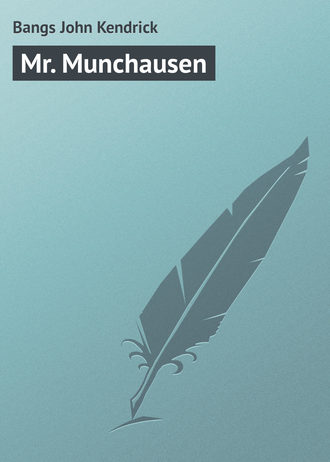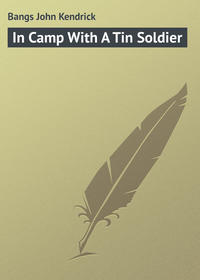 полная версия
полная версияMr. Munchausen
“Well, it happened this way,” said the Baron. “It was when I was nineteen years old. I sort of thought at that time I’d like to be a sailor, and as my father believed in letting me try whatever I wanted to do I took a position as first mate of a steam brig that plied between San Francisco and Nepaul, taking San Francisco canned tomatoes to Nepaul and bringing Nepaul pepper back to San Francisco, making several dollars both ways. Perhaps I ought to explain to you that Nepaul pepper is red, and hot; not as hot as a furnace fire, but hot enough for your papa and myself when we order oysters at a club and have them served so cold that we think they need a little more warmth to make them palatable and digestible. You are not yet old enough to know the meaning of such words as palatable and digestible, but some day you will be and then you’ll know what your Uncle means. At any rate it was on the return voyage from Nepaul that the water tank on the Betsy S. went stale and we had to stop at the first place we could to fill it up with fresh water. So we sailed along until we came in sight of an Island and the Captain appointed me and two sailors a committee of three to go ashore and see if there was a spring anywhere about. We went, and the first thing we knew we were in the midst of a lot of howling, hungry savages, who were crazy to eat us. My companions were eaten, but when it came to my turn I tried to reason with the chief. ‘Now see here, my friend,’ said I, ‘I’m perfectly willing to be served up at your breakfast, if I can only be convinced that you will enjoy eating me. What I don’t want is to have my life wasted!’ ‘That’s reasonable enough,’ said he. ‘Have you got a sample of yourself along for me to taste?’ ‘I have,’ I replied, taking out a bottle of Nepaul pepper, that by rare good luck I happened to have in my pocket. ‘That is a portion of my left foot powdered. It will give you some idea of what I taste like,’ I added. ‘If you like that, you’ll like me. If you don’t, you won’t.’”
“That was fine,” said Diavolo. “You told pretty near the truth, too, Uncle Munch, because you are hot stuff yourself, ain’t you?”
“I am so considered, my boy,” said Mr. Munchausen. “The chief took a teaspoonful of the pepper down at a gulp, and let me go when he recovered. He said he guessed I wasn’t quite his style, and he thought I’d better depart before I set fire to the town. So I filled up the water bag, got into the row-boat, and started back to the ship, but the Betsy S. had gone and I was forced to row all the way to San Francisco, one thousand, five hundred and sixty-two miles distant. The captain and crew had given us all up for lost. I covered the distance in six weeks, living on water and Nepaul pepper, and when I finally reached home, I told my father that, after all, I was not so sure that I liked a sailor’s life. But I never forgot those cannibals or their island, as you may well imagine. They and their home always interested me hugely and I resolved if the fates ever drove me that way again, I would go ashore and see how the people were getting on. The fates, however, were a long time in drawing me that way again, for it was not until July, ten years ago that I reached there the second time. I was off on a yachting trip, with an English friend, when one afternoon we dropped anchor off that Cannibal Island.
“‘Let’s go ashore,’ said I. ‘What for?’ said my host; and then I told him the story and we went, and it was well we did so, for it was then and there that I discovered the new way the missionaries had of celebrating Decoration Day.
“No sooner had we landed than we noticed that the Island had become civilised. There were churches, and instead of tents and mud-hovels, beautiful residences appeared here and there, through the trees. ‘I fancy this isn’t the island,’ said my host. ‘There aren’t any cannibals about here.’ I was about to reply indignantly, for I was afraid he was doubting the truth of my story, when from the top of a hill, not far distant, we heard strains of music. We went to see whence it came, and what do you suppose we saw? Five hundred villainous looking cannibals marching ten abreast along a fine street, and, cheering them from the balconies of the houses that fronted on the highway, were the missionaries and their friends and their children and their wives.
“‘This can’t be the place, after all,’ said my host again.
“‘Yes it is,’ said I, ‘only it has been converted. They must be celebrating some native festival.’ Then as I spoke the procession stopped and the head missionary followed by a band of beautiful girls, came down from a platform and placed garlands of flowers and beautiful wreaths on the shoulders and heads of those reformed cannibals. In less than an hour every one of the huge black fellows was covered with roses and pinks and fragrant flowers of all kinds, and then they started on parade again. It was a fine sight, but I couldn’t understand what it was all done for until that night, when I dined with the head missionary – and what do you suppose it was?”
“I give it up,” said Diavolo, “maybe the missionaries thought the cannibals didn’t have enough clothes on.”
“I guess I can’t guess,” said Angelica.
“They were celebrating Decoration Day,” said Mr. Munchausen. “They were strewing flowers on the graves of departed missionaries.”
“You didn’t tell us about any graves,” said Diavolo.
“Why certainly I did,” said the Baron. “The cannibals themselves were the only graves those poor departed missionaries ever had. Every one of those five hundred savages was the grave of a missionary, my dears, and having been converted, and taught that it was not good to eat their fellow-men, they did all in their power afterwards to show their repentance, keeping alive the memory of the men they had treated so badly by decorating themselves on memorial day – and one old fellow, the savagest looking, but now the kindest-hearted being in the world, used always to wear about his neck a huge sign, upon which he had painted in great black letters:
HERE LIES
JOHN THOMAS WILKINS,
SAILOR.
DEPARTED THIS LIFE, MAY 24TH, 1861.
HE WAS A MAN OF SPLENDID TASTE.
“The old cannibal had eaten Wilkins and later when he had been converted and realised that he himself was the grave of a worthy man, as an expiation he devoted his life to the memory of John Thomas Wilkins, and as a matter of fact, on the Cannibal Island Decoration Day he would lie flat on the floor all the day, groaning under the weight of a hundred potted plants, which he placed upon himself in memory of Wilkins.”
Here Mr. Munchausen paused for breath, and the twins went out into the garden to try to imagine with the aid of a few practical experiments how a cannibal would look with a hundred potted plants adorning his person.
X
MR. MUNCHAUSEN’S ADVENTURE WITH A SHARK
Mr. and Mrs. Henry B. Ananias.
THURSDAYS. CIMMERIA.
This was the card sent by the reporter of the Gehenna Gazette, and Mrs. Ananias to Mr. Munchausen upon his return from a trip to mortal realms concerning which many curious reports have crept into circulation. Owing to a rumour persistently circulated at one time, Mr. Munchausen had been eaten by a shark, and it was with the intention of learning, if possible, the basis for the rumour that Ananias and Sapphira called upon the redoubtable Baron of other days.
Mr. Munchausen graciously received the callers and asked what he could do for them.
“Our readers, Mr. Munchausen,” explained Ananias, “have been much concerned over rumours of your death at the hands of a shark.”
“Sharks have no hands,” said the Baron quietly.
“Well – that aside,” observed Ananias. “Were you killed by a shark?”
“Not that I recall,” said the Baron. “I may have been, but I don’t remember it. Indeed I recall only one adventure with a shark. That grew out of my mission on behalf of France to the Czar of Russia. I carried letters once from the King of France to his Imperial Coolness the Czar.”
“What was the nature of the letters?” asked Ananias.
“I never knew,” replied the Baron. “As I have said, it was a secret mission, and the French Government never took me into its confidence. The only thing I know about it is that I was sent to St. Petersburg, and I went, and in the course of time I made myself much beloved of both the people and his Majesty the Czar. I am the only person that ever lived that was liked equally by both, and if I had attached myself permanently to the Czar, Russia would have been a different country to-day.”
“What country would it have been, Mr. Munchausen,” asked Sapphira innocently, “Germany or Siam?”
“I can’t specify, my dear madame,” the Baron replied. “It wouldn’t be fair. But, at any rate, I went to Russia, and was treated warmly by everybody, except the climate, which was, as it is at all times, very freezing. That’s the reason the Russian people like the climate. It is the only thing the Czar can’t change by Imperial decree, and the people admire its independence and endure it for that reason. But as I have said, everybody was pleased with me, and the Czar showed me unusual attention. He gave fêtes in my honour. He gave the most princely dinners, and I met the very best people in St. Petersburg, and at one of these dinners I was invited to join a yachting party on a cruise around the world.
“Well, of course, though a landsman in every sense of the word, I am fond of yachting, and I immediately accepted the invitation. The yacht we went on was the Boomski Zboomah, belonging to Prince – er – now what was that Prince’s name! Something like – er – Sheeroff or Jibski – or – er – well, never mind that. I meet so many princes it is difficult to remember their names. We’ll say his name was Jibski.”
“Suppose we do,” said Ananias, with a jealous grin. “Jibski is such a remarkable name. It will look well in print.”
“All right,” said the Baron, “Jibski be it. The yacht belonged to Prince Jibski, and she was a beauty. There was a stateroom and a steward for everybody on board, and nothing that could contribute to a man’s comfort was left unattended to. We set sail on the 23rd of August, and after cruising about the North coast of Europe for a week or two, we steered the craft south, and along about the middle of September we reached the Amphibian Islands, and anchored. It was here that I had my first and last experience with sharks. If they had been plain, ordinary sharks I’d have had an easy time of it, but when you get hold of these Amphibian sharks you are likely to get yourself into twenty-three different kinds of trouble.”
“My!” said Sapphira. “All those? Does the number include being struck by lightning?”
“Yes,” the Baron answered, “And when you remember that there are only twenty-four different kinds altogether you can see what a peck of trouble an Amphibian shark can get you into. I thought my last hour had come when I met with him. You see when we reached the Amphibian Islands, we naturally thought we’d like to go ashore and pick the cocoanuts and raisins and other things that grow there, and when I got upon dry land again I felt strongly tempted to go down upon the beautiful little beach in the harbour and take a swim. Prince Jibski advised me against it, but I was set upon going. He told me the place was full of sharks, but I wasn’t afraid because I was always a remarkably rapid swimmer, and I felt confident of my ability, in case I saw a shark coming after me, to swim ashore before he could possibly catch me, provided I had ten yards start. So in I went leaving my gun and clothing on the beach. Oh, it was fun! The water was quite warm, and the sandy bottom of the bay was deliciously soft and pleasant to the feet. I suppose I must have sported in the waves for ten or fifteen minutes before the trouble came. I had just turned a somersault in the water, when, as my head came to the surface, I saw directly in front of me, the unmistakable fin of a shark, and to my unspeakable dismay not more than five feet away. As I told you, if it had been ten yards away I should have had no fear, but five feet meant another story altogether. My heart fairly jumped into my mouth. It would have sunk into my boots if I had had them on, but I hadn’t, so it leaped upward into my mouth as I turned to swim ashore, by which time the shark had reduced the distance between us by one foot. I feared that all was up with me, and was trying to think of an appropriate set of last words, when Prince Jibski, noting my peril, fired one of the yacht’s cannon in our direction. Ordinarily this would have been useless, for the yacht’s cannon was never loaded with anything but a blank charge, but in this instance it was better than if it had been loaded with ball and shot, for not only did the sound of the explosion attract the attention of the shark and cause him to pause for a moment, but also the wadding from the gun dropped directly upon my back, so showing that Prince Jibski’s aim was not as good as it might have been. Had the cannon been loaded with a ball or a shell, you can very well understand how it would have happened that yours truly would have been killed then and there.”
“We should have missed you,” said Ananias sweetly.
“Thanks,” said the Baron. “But to resume. The shark’s pause gave me the start I needed, and the heat from the burning wadding right between my shoulders caused me to redouble my efforts to get away from the shark and it, so that I never swam faster in my life, and was soon standing upon the shore, jeering at my fearful pursuer, who, strange to say, showed no inclination to stop the chase now that I was, as I thought, safely out of his reach. I didn’t jeer very long I can tell you, for in another minute I saw why the shark didn’t stop chasing me, and why Amphibian sharks are worse than any other kind. That shark had not only fins like all other sharks to swim with, but he had likewise three pairs of legs that he could use on land quite as well as he could use the fins in the water. And then began the prettiest chase you ever saw in your life. As he emerged from the water I grabbed up my gun and ran. Round and round the island we tore, I ahead, he thirty or forty yards behind, until I got to a place where I could stop running and take a hasty shot at him. Then I aimed, and fired. My aim was good, but struck one of the huge creature’s teeth, broke it off short, and bounded off to one side. This made him more angry than ever, and he redoubled his efforts to catch me. I redoubled mine, until I could get another shot at him. The second shot, like the first, struck the creature in the teeth, only this time it was more effective. The bullet hit his jaw lengthwise, and knocked every tooth on that side of his head down his throat. So it went. I ran. He pursued. I fired; he lost his teeth, until finally I had knocked out every tooth he had, and then, of course, I wasn’t afraid of him, and let him come up with me. With his teeth he could have ground me to atoms at one bite. Without them he was as powerless as a bowl of currant jelly, and when he opened his huge jaws, as he supposed to bite me in two, he was the most surprised looking fish you ever saw on land or sea to discover that the effect his jaws had upon my safety was about as great as had they been nothing but two feather bed mattresses.”
“You must have been badly frightened, though,” said Ananias.
“No,” said the Baron. “I laughed in the poor disappointed thing’s face, and with a howl of despair, he rushed back into the sea again. I made the best time I could back to the yacht for fear he might return with assistance.”
“And didn’t you ever see him again, Baron?” asked Sapphira.
“Yes, but only from the deck of the yacht as we were weighing anchor,” said Mr. Munchausen. “I saw him and a dozen others like him doing precisely what I thought they would do, going ashore to search me out so as to have a little cold Munch for dinner. I’m glad they were disappointed, aren’t you?”
“Yes, indeed,” said Ananias and Sapphira, but not warmly.
Ananias was silent for a moment, and then walking over to one of the bookcases, he returned in a moment, bringing with him a huge atlas.
“Where are the Amphibian Islands, Mr. Munchausen?” he said, opening the book. “Show them to me on the map. I’d like to print the map with my story.”
“Oh, I can’t do that,” said the Baron, “because they aren’t on the map any more. When I got back to Europe and told the map-makers about the dangers to man on those islands, they said that the interests of humanity demanded that they be lost. So they took them out of all the geographies, and all the cyclopædias, and all the other books, so that nobody ever again should be tempted to go there; and there isn’t a school-teacher or a sailor in the world to-day who could tell you where they are.”
“But, you know, don’t you?” persisted Ananias.
“Well, I did,” said the Baron; “but, really I have had to remember so many other things that I have forgotten that. All that I know is that they were named from the fact that they were infested by Amphibious animals, which are animals that can live on land as well as on water.”
“How strange!” said Sapphira.
“It’s just too queer for anything,” said Ananias, “but on the whole I’m not surprised.”
And the Baron said he was glad to hear it.
XI
THE BARON AS A RUNNER
The Twins had been on the lookout for the Baron for at least an hour, and still he did not come, and the little Imps were beginning to feel blue over the prospect of getting the usual Sunday afternoon story. It was past four o’clock, and for as long a time as they could remember the Baron had never failed to arrive by three o’clock. All sorts of dreadful possibilities came up before their mind’s eye. They pictured the Baron in accidents of many sorts. They conjured up visions of him lying wounded beneath the ruins of an apartment house, or something else equally heavy that might have fallen upon him on his way from his rooms to the station, but that he was more than wounded they did not believe, for they knew that the Baron was not the sort of man to be killed by anything killing under the sun.
“I wonder where he can be?” said Angelica, uneasily to her brother, who was waiting with equal anxiety for their common friend.
“Oh, he’s all right!” said Diavolo, with a confidence he did not really feel. “He’ll turn up all right, and even if he’s two hours late he’ll be here on time according to his own watch. Just you wait and see.”
And they did wait and they did see. They waited for ten minutes, when the Baron drove up, smiling as ever, but apparently a little out of breath. I should not dare to say that he was really out of breath, but he certainly did seem to be so, for he panted visibly, and for two or three minutes after his arrival was quite unable to ask the Imps the usual question as to their very good health. Finally, however, the customary courtesies of the greeting were exchanged, and the decks were cleared for action.
“What kept you, Uncle Munch?” asked the Twins, as they took up their usual position on the Baron’s knees.
“What what?” replied the warrior. “Kept me? Why, am I late?”
“Two hours,” said the Twins. “Dad gave you up and went out for a walk.”
“Nonsense,” said the Baron. “I’m never that late.”
Here he looked at his watch.
“Why I do seem to be behind time. There must be something wrong with our time-pieces. I can’t be two hours late, you know.”
“Well, let’s say you are on time, then,” said the Twins. “What kept you?”
“A very funny accident on the railroad,” said the Baron lighting a cigar. “Queerest accident that ever happened to me on the railroad, too. Our engine ran away.”
The Twins laughed as if they thought the Baron was trying to fool them.
“Really,” said the Baron. “I left town as usual on the two o’clock train, which, as you know, comes through in half an hour, without a stop. Everything went along smoothly until we reached the Vitriol Reservoir, when much to the surprise of everybody the train came to a stand-still. I supposed there was a cow on the track, and so kept in my seat for three or four minutes as did every one else. Finally the conductor came through and called to the brakeman at the end of our car to see if his brakes were all right.
“‘It’s the most unaccountable thing,’ he said to me. ‘Here’s this train come to a dead stop and I can’t see why. There isn’t a brake out of order on any one of the cars, and there isn’t any earthly reason why we shouldn’t go ahead.’
“‘Maybe somebody’s upset a bottle of glue on the track,’ said I. I always like to chaff the conductor, you know, though as far as that is concerned, I remember once when I was travelling on a South American Railway our train was stopped by highwaymen, who smeared the tracks with a peculiar sort of gum. They’d spread it over three miles of track, and after the train had gone lightly over two miles of it the wheels stuck so fast ten engines couldn’t have moved it. That was a terrible affair.”
“I don’t think we ever heard of that, did we?” asked Angelica.
“I don’t remember it,” said Diavolo.
“Well, you would have remembered it, if you had ever heard of it,” said the Baron. “It was too dreadful to be forgotten – not for us, you know, but for the robbers. It was one of the Imperial trains in Brazil, and if it hadn’t been for me the Emperor would have been carried off and held for ransom. The train was brought to a stand-still by this gluey stuff, as I have told you, and the desperadoes boarded the cars and proceeded to rifle us of our possessions. The Emperor was in the car back of mine, and the robbers made directly for him, but fathoming their intention I followed close upon their heels.
“‘You are our game,’ said the chief robber, tapping the Emperor on the shoulder, as he entered the Imperial car.
“‘Hands off,’ I cried throwing the ruffian to one side.
“He scowled dreadfully at me, the Emperor looked surprised, and another one of the robbers requested to know who was I that I should speak with so much authority. ‘Who am I?’ said I, with a wink at the Emperor. ‘Who am I? Who else but Baron Munchausen of the Bodenwerder National Guard, ex-friend of Napoleon of France, intimate of the Mikado of Japan, and famed the world over as the deadliest shot in two hemispheres.’
“The desperadoes paled visibly as I spoke, and after making due apologies for interfering with the train, fled shrieking from the car. They had heard of me before.
“‘I thank you, sir,’ began the Emperor, as the would-be assassins fled, but I cut him short. ‘They must not be allowed to escape,’ I said, and with that I started in pursuit of the desperate fellows, overtook them, and glued them with the gum they had prepared for our detention to the face of a precipice that rose abruptly from the side of the railway, one hundred and ten feet above the level. There I left them. We melted the glue from the tracks by means of our steam heating apparatus, and were soon booming merrily on our way to Rio Janeiro when I was fêted and dined continuously for weeks by the people, though strange to say the Emperor’s behaviour toward me was very cool.”
“And did the robbers ever get down?” asked the Twins.
“Yes, but not in a way they liked,” Mr. Munchausen replied. “The sun came out, and after a week or two melted the glue that held them to the precipice, whereupon they fell to its base and were shattered into pieces so small there wasn’t an atom of them to be found when a month later I passed that way again on my return trip.”
“And didn’t the Emperor treat you well, Uncle Munch?” asked the Imps.
“No – as I told you he was very cool towards me, and I couldn’t understand it, then, but I do now,” said the Baron. “You see he was very much in need of ready cash, the Emperor was, and as the taxpayers were already growling about the expenses of the Government he didn’t dare raise the money by means of a tax. So he arranged with the desperadoes to stop the train, capture him, and hold him for ransom. Then when the ransom came along he was going to divide up with them. My sudden appearance, coupled with my determination to rescue him, spoiled his plan, you see, and so he naturally wasn’t very grateful. Poor fellow, I was very sorry for it afterward, because he really was an excellent ruler, and his plan of raising the money he needed wasn’t a bit less honest than most other ways rulers employ to obtain revenue for State purposes.”









